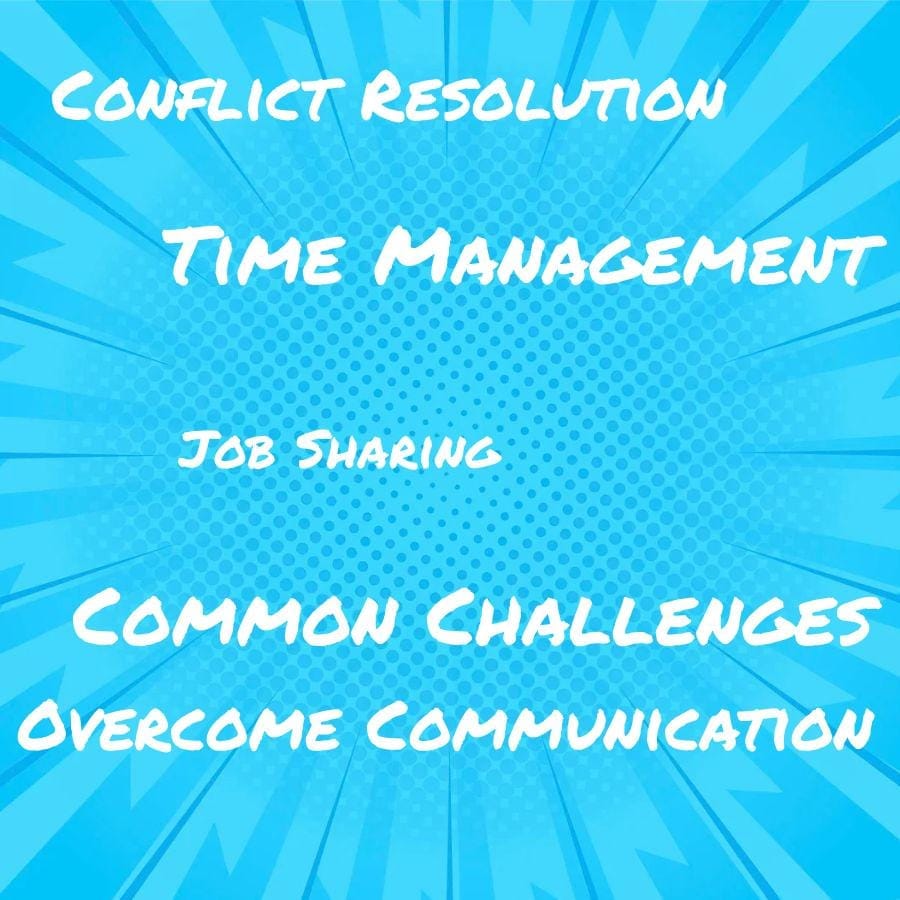Common challenges of job sharing include communication issues, workload imbalance, and scheduling conflicts. To overcome these challenges, employers can create clear job descriptions and expectations for both employees, provide adequate training on how to communicate effectively with each other, and ensure that the workload is evenly distributed. Additionally, employers should strive to create flexible schedules that accommodate both employees’ needs.
Job sharing can be an attractive option for many employers and employees, as it allows for more flexible work arrangements and the potential to increase productivity. However, there are some common challenges associated with job sharing that must be addressed in order to make it a successful arrangement.
In this blog post, we will explore what these challenges are and provide strategies on how they can be overcome.
Communication

When two people are responsible for a single role, it can be difficult to ensure that both parties are on the same page and understand their individual responsibilities. This challenge can be further compounded if the two individuals have different communication styles or preferences.
To overcome this challenge, it is important to establish clear lines of communication between both job sharers from the outset. This could include setting up regular check-ins with each other, agreeing on how information will be shared (e.g., email, phone calls), and creating a system for tracking progress and tasks completed by each person.
Having an open dialogue about any issues or concerns that arise during job sharing can help ensure that everyone is working together effectively towards achieving their goals.
Scheduling
It involves coordinating the work hours and responsibilities between two or more people who are sharing a single job. This can be difficult because each person has their own individual needs, such as family commitments, other jobs, or personal interests.
It can be hard to find times when all parties involved are available to work together. To overcome this challenge, it is important for those involved in job sharing to communicate openly and honestly about their availability and preferences.
They should also create a schedule that works for everyone by taking into account each person’s individual needs and circumstances. It may also help to set up regular meetings where everyone can discuss any changes or issues that arise with the current schedule so they can make adjustments as needed.
Having clear expectations from the start will help ensure that everyone understands what is expected of them in terms of hours worked and tasks completed on time.
Time Management
Job sharing involves two or more people splitting a full-time job, which can make it difficult to coordinate schedules and ensure that tasks are completed on time. This challenge can be overcome by setting clear expectations for each person’s responsibilities and deadlines, as well as establishing a system for communication between the job sharers.
It is also important to create an environment where both parties feel comfortable asking questions and voicing concerns about their workloads. Having regular check-ins with supervisors can help ensure that everyone involved in the job share understands their roles and responsibilities, as well as any changes or updates to those roles over time.
Conflict Resolution
One of the most common challenges is conflict resolution. Conflict resolution in job sharing occurs when two people have different ideas about how to approach a task or disagree on how something should be done.
This type of conflict can lead to tension and frustration between the two individuals, which can affect their ability to work together effectively. In order to overcome this challenge, both parties must be willing to communicate openly and honestly with each other about their differences and come up with solutions that are mutually beneficial.
It’s important for both parties to remember that they are working together towards a common goal and that compromise is key in resolving any disagreements. Having clear expectations from the beginning will help ensure that everyone understands what needs to be done and how it should be accomplished.
Setting aside time for regular check-ins will allow both parties an opportunity to discuss any issues or concerns they may have before they become too large of an issue.
Trust Building
When two people are working together, it is essential that they trust each other to do their part and complete tasks in a timely manner. Without trust, the job sharing arrangement can quickly become unbalanced and inefficient.
Building trust between two job sharers requires open communication and mutual respect for each other’s work styles and preferences. It also involves setting clear expectations about roles, responsibilities, deadlines, and communication protocols from the start of the arrangement.
Both parties should be willing to compromise when needed in order to ensure that everyone’s needs are met. It is important for both parties to take responsibility for their own actions and mistakes so that any issues can be addressed quickly without blame or resentment towards either party.
By taking these steps early on in the job sharing relationship, both parties will have a better chance at developing a trusting partnership that will last throughout their time working together.
Collaboration
This means that both parties must be able to communicate effectively and work together in order to achieve the desired outcome. Common challenges of job sharing include finding ways to divide tasks fairly, managing different schedules and workloads, and resolving conflicts between team members.
To overcome these challenges, it is important for all involved parties to have clear expectations about their roles and responsibilities within the job share arrangement. Setting up regular meetings with both partners can help ensure that everyone is on the same page when it comes to progress updates and any changes that need to be made.
Having open communication channels between all involved parties can help resolve any potential issues before they become too large or unmanageable.